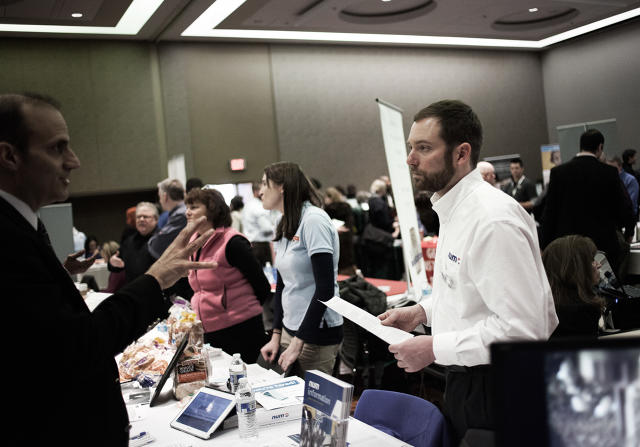THE FOUR TRENDS THAT WILL CHANGE THE WAY WE WORK BY 2021
HINT: THE RISE OF THE GIG ECONOMY IS ONLY THE START OF WHAT'S COMING.
In some ways, 2015 was the year of the gig economy, with the scale and diversity of the freelance workforce not just expanding, but attracting more mainstream notice as well. By our own recent estimates here at Upwork, some54 million Americans are now freelancers.
Still, that's just the most noticeable trend among several that will reshape the nature of work in the next five years. In fact, shifts in technology, connectivity, and the expectations of both employers and employees are on track to bring about bigger changes than the freelance economy can on its own. Here are four.

1. THE RISE OF SECOND-TIER CITIES
The 20th century saw big, cosmopolitan cities boom. The best jobs and top talent were concentrated in a few "first-tier" urban centers like San Francisco, New York, London, Tokyo, Los Angeles, and Paris. If you wanted a job, you had to move to one of those places.
That's already changing. The major urban hubs have largely exhausted their stores of opportunity. The cost of living is now outpacing salaries in many of those places. In Los Angeles, rents are rising twice as fast as inflation; in San Francisco earlier this year, rents grew a massive 15%. As a result, residents' purchasing power is shrinking.
I recently heard about a case in East Menlo Park—one of the few low-income neighborhoods remaining in Silicon Valley—where the owners were renting 12 bunk beds in a broken-down house for $1,000 per month apiece. There’s just so much demand that absurd rates like this are now commonplace.
This is one reason that the fastest-growing cities of the past 10 years have included such "second-tier" places as Houston, Austin, Raleigh, Seattle, and Denver. It’s just cheaper to live and do business there.
Meanwhile, technology is making it far easier for people to live in places other than the largest hubs and still have access to jobs they otherwise wouldn't. Dropbox, Google Hangouts, Skype, and other key tools in the remote worker toolkit make it possible to be productive from just about anywhere, no matter where your employer or clients are based.
This is especially true for freelancers. In arecent study co-sponsored by my company Upwork and the Freelancers Union, one-third of freelancers say they were able to move as a result of the flexibility freelancing offered them.
Michelle Decker lives in Atlanta and has been freelancing since 2011. She and her husband are both working at home, so they have more time to raise their family—without having to spend time commuting or paying for day care—and says she's making more than she would in a local job. They dream of moving to Europe and living in an RV with their children as "digital nomads," a lifestyle choice that would've been unthinkable a decade ago.
Many businesses are becoming more flexible, too. It's in no one's interest to have a substantial part of the workforce spend two hours each day navigating traffic when there are simple, easy-to-use alternatives that in many cases work better.
It's getting ever more apparent that companies that take a hard line on working in the office, like Yahoo did in 2013, risk losing the most talented workers. A recent study showed that 70% of employees would switch jobs if it gave them more flexibility.

2. MORE NANODEGREES AND NANOJOBS
Differentiated labor is a basic building block of complex societies and has been around far longer than the Industrial Revolution that accelerated it. But technological change is ensuring that ever greater specialization continues into the 21st century. Particularly in technical fields like software engineering, security, hardware design, and product management, the skills required are simply too numerous for any one person to master.
If the need for greater specialized expertise is growing, it's at least partly because the demand for those skills is changing more rapidly than ever. But paradoxically, we aren't becoming ever smaller widgets; no one is a "specialist for life" in any one thing any longer. You always have to be ready to switch from Java to Objective C, from PHP to Ruby, from statistical analysis to big data, from media relations to social media management.
The half-life of a skill is shrinking, which points to the growing need for continuous education and re-education. Rather than earning one big degree then going to look for a lifelong job at a single corporation, most smart workers will now follow a repeatable cycle: learn, work, learn, work.
The online-learning company Udacity offers what it's termed "nanodegrees."Graduates then follow those degrees with "nanojobs," where they work for a year or two, cementing what they learned and picking up practical skills—until it’s time to move on and learn something new.
That means the emphasis on employee retention might be at least somewhat misplaced. More and more, companies need to adapt to the fact that team members aren't going to be with them for a long time, and professionals need to adapt to the fact that companies aren’t going to need them for a long time.
My dad worked for the same company for 40 years. I’ve never worked for a company for more than five or six. Today, the average time that workers stay with one employer is 4.6 years, according to the Bureau of Labor Statistics. Actually, that average is probably misleading, because some workers stay with one employee for many years, while the ones whose skills are in relatively higher demand stay much less than four years.
More certain is this: While job-hopping still carries some stigma, it's fast becoming less of a disadvantage in the workforce.

3. JOB SEEKERS GET CHOOSIER
People are going to be more selective about the jobs they take, not based merely on compensation, but on how those positions fit with their values, lifestyles, and professional development goals.
Why? Let's look at the trends. In the past few years, corporate profits have surged to record highs, but wages are at their lowest level in 65 years. Labor productivity has leveled off in the U.S. over the past decade, and even though the recovery from the last financial crisis has picked up, economic growth overall has slowed. In the 1970s, global GDP growth was in the 6% to 8% range. Now it’s between 2% and 4% annually.
As a result, professional growth for individuals working within established companies has also been flat; their salaries aren’t growing as much, and they aren’t getting as many promotions. So it's no wonder that people are starting to look for other opportunities. And when economic payoffs are less than desirable, they start optimizing around other factors, such as how much they can learn, whether they have better work-life balance, or whether they can live somewhere more pleasant for less.
These seem like small shifts in priorities, but they've been in the works for decades, and their potential to alter the profile of the workforce and the very nature of work is enormous. Ultimately, companies will need to get used to the idea that professional growth means more than simply growth in income—and that job seekers who are more likely to weigh a greater range of factors will be choosier overall.

4. ENTREPRENEURSHIP EXPANDS
The opportunities for entrepreneurship have steadily become better distributed around the country. But there's also a growing segment of people who are turning into entrepreneurs in a different sense—without having a big idea or creating a product. Rather than founding a startup, they're simply working independently as freelancers or by teaming up with one another.
You may not see this as a form of entrepreneurship, but as the freelance economy expands, that's precisely what it will come to resemble more and more. When they start out, some freelancers increase their income simply by working more hours. But once they’ve quit their day job and are dedicating 30 or 40 hours a week to their business, there are two ways to start making more money: either by becoming more specialized so they can charge higher rates, or by engaging other freelancers, freeing them up to tackle bigger, higher-level projects themselves. We’ll see more freelancers cultivating specialties and forming teams that let them earn bigger revenues than ever before.
Or they'll take advantage of those knowledge networks and launch startups of their own. In the 20th century, the economist Ronald Coase explained how large firms grew ever bigger because the transaction cost of hiring people for short-term jobs was too high; it was simply more efficient to continue growing the size of companies and performing work in-house. That trend is reversing.
It can actually be more efficient now to get work done with ad-hoc teams. In fact, McKinsey Global Institute recently estimated that this shift could add $2.7 trillion to global GDP by 2025—a shift that creates a huge opportunity for entrepreneurial freelancers.
No comments:
Post a Comment